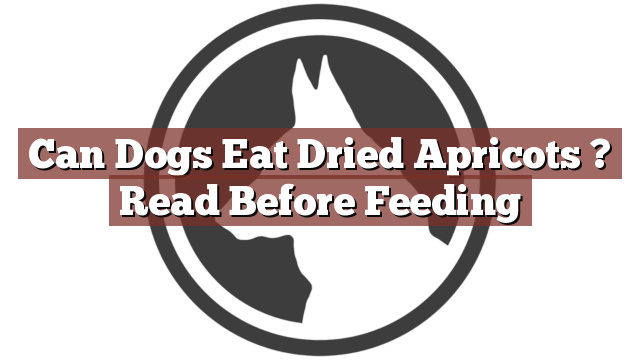Understanding Your Dog’s Dietary Needs
As a responsible pet owner, it is crucial to understand your dog’s dietary needs to ensure their overall health and well-being. Dogs have different nutritional requirements than humans, and their diet should primarily consist of high-quality dog food that is specifically formulated to meet their needs. While it can be tempting to share our food with our furry friends, it is important to be cautious about what we feed them.
Can Dogs Eat Dried Apricots? Read Before Feeding
Can dogs eat dried apricots? This is a common question among pet owners. The answer is yes, but with caution and in moderation. Dried apricots are a good source of fiber, potassium, and beta-carotene, which can be beneficial for your dog’s health. However, it is important to remember that they are also high in sugar and can be a choking hazard if not properly prepared.
Before feeding your dog dried apricots, it is essential to remove the pit or stone as it can be toxic and pose a choking hazard. The pit contains amygdalin, a chemical compound that releases cyanide when ingested. Cyanide can be extremely harmful to dogs and can lead to severe health issues or even death. Therefore, it is crucial to ensure that your dog only consumes the flesh of the dried apricot, without any traces of the pit.
Pros and Cons of Feeding Dried Apricots to Dogs
Feeding dried apricots to your dog can have both pros and cons. On the positive side, dried apricots can provide essential nutrients and promote a healthy digestive system due to their high fiber content. The fiber aids in regulating bowel movements and can be beneficial for dogs with constipation or other digestive issues. Additionally, dried apricots contain potassium, which is important for maintaining a healthy heart and muscles.
However, it is vital to consider the cons as well. As mentioned earlier, dried apricots are high in sugar content, so they should only be given to dogs in moderation. Excessive sugar intake can lead to weight gain, dental problems, and even diabetes in dogs. Furthermore, some dogs may have allergies or sensitivities to certain fruits, including dried apricots. It is always recommended to introduce new foods gradually and monitor your dog for any adverse reactions.
In Conclusion: Be Cautious and Consult a Vet
While dried apricots can be included as an occasional treat for your dog, it is important to exercise caution and moderation. Always remove the pit or stone to avoid any potential health risks. If you are uncertain or have concerns about feeding dried apricots to your dog, it is best to consult with your veterinarian. They can provide personalized advice based on your dog’s specific dietary needs and any pre-existing health conditions. Remember, the key to a healthy and balanced diet for your dog is to provide them with a nutritionally complete and appropriate dog food as their primary source of nutrition.
Thank you for taking the time to read through our exploration of [page_title]. As every dog lover knows, our furry friends have unique dietary needs and responses, often varying from one canine to another. This is why it's paramount to approach any changes in their diet with caution and knowledge.
Before introducing any new treats or making alterations to your dog's diet based on our insights, it's crucial to consult with a veterinarian about [page_title]. Their expertise ensures that the choices you make are well-suited to your particular pet's health and well-being.
Even seemingly harmless foods can sometimes lead to allergic reactions or digestive issues, which is why monitoring your dog after introducing any new food item is essential.
The content provided here on [page_title] is crafted with care, thorough research, and a genuine love for dogs. Nevertheless, it serves as a general guideline and should not be considered a substitute for professional veterinary advice.
Always prioritize the expert insights of your veterinarian, and remember that the health and happiness of your furry companion come first.
May your journey with your pet continue to be filled with joy, love, and safe culinary adventures. Happy reading, and even happier snacking for your canine friend!

